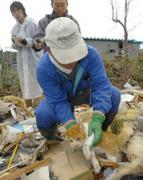Helping Pets in Japan

Helping Pets in Japan
In the wake of the tragic news of the earthquake and tsunami in Japan, it is not surprising that reporters are also writing about the terrible effects these disasters have had on pets. I have noted some internet news specifically regarding post traumatic stress disorder (PTSD).
I checked books on animal behavior and found virtually no information on the topic in standard veterinary behavior books. The lack of information made me wonder if the diagnosis of PTSD was a human psychiatric disorder incorrectly attributed to pets. So I contacted a fellow dog lover and a professor of Clinical Psychiatry at Weill Cornell Medical College, just up the street from The Animal Medical Center.
Dr. Richard A. Friedman explained to me how PTSD develops and how researchers study the disease. A benign occurrence such as the sound of a bell precedes a noxious stimulus such as a small, safe electric shock. Pairing the harmless sound with the noxious stimulus now makes the animal associate the sound with the painful shock and it has a fear response to the sound. This form of classical Pavlovian conditioning links a previously harmful stimulus (sound) to the hard-wired fear response and involves the formation of new neural connections in the brain, particularly in the amygdale — a region critical to fear response.
Once PTSD has developed, presenting the sound repeatedly to the animal, without a shock, the sound will ultimately cease to elicit a fear response, a phenomenon called extinction, which is essentially how psychiatrists like Dr. Friedman treat PTSD in humans.
This explanation of PTSD does not fit the one time earthquake/tsunami experienced by the Japanese pets now displaced from their homes and living in shelters. That is not to say these animals are not experiencing both mental and physical stress. Anxiety can result from the inability to escape or control situations that elicit an initial fear response. This definition makes it easy to imagine how displaced pets in post-earthquake Japan might be suffering from anxiety due to the loss of their home, their family and their normal routines. The physical manifestations of anxiety may be inappropriate eliminations, noise phobias and destructive behavior.
Many organizations aimed at helping animals are working together in Japan. The Japanese Animal Hospital Association (JAHA) has 45 member hospitals in the disaster area. JAHA President Takuo Ishida reports they are supporting relief efforts through two funds.
According to President Ishida, “One is for animals and their families, and the other is for veterinary hospitals. JAHA is now asking for relief donations via web site and letters to the member hospitals. The donations for the former purpose will be sent to Japanese SPCA and those for the latter will be sent to Japanese Veterinary Medical Association.”
World Vets, based in Fargo, North Dakota has some teams on the ground in Japan, but a full scale effort is hampered by the current radiation concerns due to damage of the Fukushima Daiichi nuclear power plant.
The American Veterinary Medical Foundation (AVMF) anticipates the animal relief efforts will ramp up shortly and be in operation for many months to come. The AVMF’s Animal Disaster Relief and Reimbursement Fund will be supporting animal disaster relief in Japan.
All the organizations included in the links above, as well as many others are accepting donations towards Japanese animal relief efforts.
____________________________________________________________
This may also be found in the “Tales from the Pet Clinic” blog on WebMD.com.
For over a century, The Animal Medical Center has been a national leader in animal health care, known for its expertise, innovation and success in providing routine, specialty and emergency medical care for companion animals. Thanks in part to the enduring generosity of donors, The AMC is also known for its outstanding teaching, research and compassionate community funds. Please help us to continue these efforts. Send your contribution to: The Animal Medical Center, 510 East 62nd Street, New York, NY 10065. For more information, visit www.amcny.org. To make an appointment, please call 212.838.7053.


































